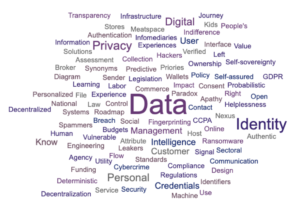Have you noticed? The world is awash in conversations about personal data and identity. Start talking about personal data and identity with someone, especially if they’re in the industry, and all kinds of buzzwords and triggers pop into the conversation. You’ll hear terms like these.

There are so many terms out there; it is difficult to know where to even start. I certainly can’t define all the terms right here, right now, but not to worry, I’ll be defining them in the final MEF Personal Data & Identity Market Assessment Report, which is due for release in Q4 2022.
The overarching questions I am looking to answer in this report are:
What is the PD&I Market?
What do we need to know?
What do we need to do?
Peek into my initial views, which I’ve pulled from years of experience, over 25 industry leader interviews between August and September of 2021, and hours of secondary reading.
What is the PD&I Market?
The personal data and identity market is nothing short of massive. It touches every corner of every society worldwide. Put another way, personal data and identity is driving value for the world’s societies and economies. At a macro level, it is enriching in nearly every experience an individual has. It is also powering their digital and physical (i.e. phygital) personal, commercial, and professional relationships. For instance, on the commercial front, personal data and identity are used to enhance nearly every step an individual takes along their journey with retail, healthcare, finance, automotive, government, education, and other industry sectors.
What are we measuring?
Let’s first start by defining what we are trying to measure, that being the size and potential of the personal data and identity market. It is important to consider that personal data and identity “are two sides of the same coin.” They are a lens for looking at the same thing: an individual.
An individual is a human (in marketing terms a consumer, patient, voter, shopper, data subject, member, etc.), enterprise, country, or other legally recognized sovereign entity.
For this effort, we are using a broad aperture to define personal data. Most of the time, personal data is defined in the legal sense; that is, the terms personal data and identity and bounded. The bounding term in the legal sense that is often used is “personally identifiable information (PII),” not “personal data” in general or “identity” in general. As noted, for this effort, I am broadening my definition of both personal data and identity.
How big is it?
Given these definitions, from a pure econometrics perspective, it can be quite challenging to derive a definitive number for the size of the personal data & identity market. For example, one of the challenges is what to use to anchor our market sizing measurements. An instance of this is determining whether we measure the market by:
The revenue generated from the collection and sale of attribute data
The revenues generated from identity resolution
The losses to cybercrime or the cost saved from fraud prevention
The enrichment of people’s experience from self-actualization and life improvements due to their personal use of their own personal data and identity (e.g. qualified self)
The social good generated from capturing people’s digital exhaust (minus the externalities of course)
The wealth companies generate from personal data and identity in the form of top-line and bottom-line revenue, or that countries generate in the form of GDP increases
In future articles and reports, I’ll break this all down and substantiate the numbers, but as noted before, the personal data & identity market is nothing short of massive.
On the low end, just looking at the U.S. data broker market, we’re talking about a market that can be sized at roughly USD $230 billion in 2021 to roughly $400 billion annually in 2025. Or, if you look at the various identity management infrastructure markets (i.e. secure papers market, consumer IAM, enterprise IAM, predictive analytics, multi-factor authentication, identity & verification, retail analytics, AML/KYC, data management platforms, etc.) you’re looking at a collective market valuation of $100 billion today, which is expected to grow to USD $220 billion or so by 2025.
Or, we can consider the global advertising market, which relies heavily on personal data and identity. In 2021, spending in this market is estimated at $455 billion and is expected to grow to $645 billion in 2024.
At a country level, by some estimates, just the efficiencies generated from the effective use of personal data and identity, particularly digital ID, suggest that a country’s GDP will grow annually by 1%~13% by 2030 (White et al., 2019). In the UK, for instance, one report estimates that the efficiencies generated from personal data mobility will add £28.7 billion to the annual UK GDP. This increase does not include the value generated from new innovations and entrepreneurship, as well as the benefits gained by improved personal physical and mental health, for example.
And, finally, at the value level, if you just look at the GAFM companies alone—Google, Apple, Facebook, Amazon, and Microsoft—we can see that personal data and identity have produced huge value. One could argue that over USD $3.5 trillion dollars of value annually is generated by these companies alone from the effective use of identity and personal data and identity.
What do we need to know?
No matter how you look at it, the value that can be generated from the effective use of identity and personal information is massive. There are significant personal, professional, commercial, and civic opportunities to be had. A world of abundance is laying at our feet. However, all is not rosy. Cybercrime and the misuses of personal data and identity are on the rise (we’ll quantify this later). Moreover, the individual, the data subject, is concerned. As people get more connected, their concern levels are going up; they are feeling helpless, apathetic, and indifferent. Due to the misuse of personal data, people are concerned, governments are releasing new people-centric regulations, 65% of the world’s population will be under an expected people-centric regulation by 2023, and some companies are making privacy a luxury good. Finally, people are starting to express a willingness, if not outright desire, to be in control of their personal data and identity. The problem is, however, they don’t feel they have the tools or knowledge to do it.
What do we need to do?
It is still early to say what we need to do at a macro-level, let alone a micro-level, to effectively and responsibly steward the personal data and identity market, but there is a start. Wrapping up 2022, and beyond, we (all of us–people, private and public institutions) need to focus on the following:
What’s next?
This is the first article of many to answer the question, “What is the PD&I market?” “What do we need to know?” and “What do we need to do?” In the weeks and months to come, keep an eye out for future insights as we release new articles, reports, research, executive video interviews, industry leader quotes, market-sizing assessments, ecosystem frameworks, and an index of useful resources. The ultimate goal of all this work is to provide insight, stimulate interaction among people, private, and public institutions, and make a sustainable and positive impact on the industry. You’re invited to participate and support this effort. You may have already, and if so, please reach out and let’s connect.
Sidebar: You’re Invited to Engage PD&I Market Assessment Project
This is the first part of a multipart personal data & identity marketplace report I am working on with the Mobile Ecosystem Forum. The final report is scheduled for a Q4 2022 release; however, between now and then, we will be periodically releasing articles, reports, video interviews, industry ecosystem landscapes, and more. If you’d like to participate in this effort, please see MEF Personal Data & Market Assessment Project (Schedule Interview and Share Insights). You can schedule an interview with me, Michael Becker, and share any resources and ideas (reports, articles, presentations, stats, recommended solutions, company, and people, aka "movers and shakers").

No Comments.